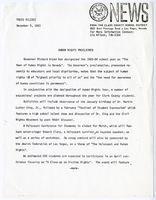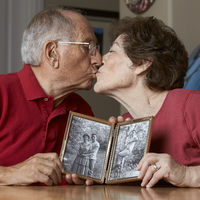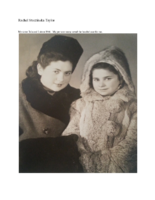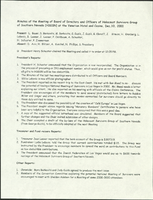Search the Special Collections and Archives Portal
Search Results

Human Rights Proclaimed press release from the Clark County School District, December 9, 1983
Date
Archival Collection
Description
Press Release titled "Human Rights Proclaimed" from the Clark County School District.
Text

Transcript of interview with Henry Kronberg by Barbara Tabach, February 26, 2015 and April 13, 2015
Date
Archival Collection
Description
Interview with Henry Kronberg by Barbara Tabach in two sessions, February 26 and April 13, 2015. In the first session Kronberg talks about his childhood in Germany and Poland and his experience being imprisoned by the Gestapo, and transported to a concentration camp. He survived the Holocaust and met his wife, and they moved to the United States in 1946. He discusses being reunited with his sister in Las Vegas after decades of searching, and moved his family to Las Vegas in 1962. Kronberg talks about becoming involved with Jewish life here, and his wife, Lillian's involvement at Temple Beth Sholom. In the second session, Kronberg discusses purchasing Stoney's, a loan and pawn shop, including some of the clientele and merchandise. He also discusses other social and environmental concerns like anti-Semitism and water resources in Southern Nevada.
Henry Kronberg was born in 1920 and spent his early childhood in a town on the border of Poland and Germany, about 40 miles from Krakow. For years he felt uncomfortable telling his story of surviving the Nazi concentration camps of World War II. Today his name is linked to the Sperling Kronberg Mack Holocaust Resource Center in Las Vegas. And in his soft-spoken manner, Henry recalls his ordeal of loss of family and survival during this most heinous of situations through backbreaking labor and ingenuity. At the end of the war, Henry met the love of his life, Lillian, also a survivor. The two married in 1946 in Frankfurt and immigrated to New Jersey where she had relatives. He describes their difficulties and the various jobs he held until becoming an excellent baker. Then in 1962 an interesting choice took him to a bar mitzvah in Canada. While there the dinner conversation lead him to a great discovery?his sister Lala had survived and was living in Las Vegas. Soon he moved his wife and daughter to Las Vegas. His first foray into business was with his brother-in-law. However, soon it was important to be independent and to control his own destiny. He purchased a going concern, Stoney's Pawn Shop, from Dr. Alexander Coblentz, one of the city's first doctors. He became the fourth owner of Stoney's and operated it until selling it to Steven Mack in 1998. Henry and his wife were active in the Jewish community. They joined Temple Beth Sholom and became fast friends with many of the early leaders of Las Vegas and became a respected member of the secular and Jewish communities.
Text

Transcript of interview with Sonja Niekerk Walther and Wilma Vandenberg, November 20, 2017
Date
Archival Collection
Description
The documentation of the Holocaust of World War II reveals the desperation of Jewish families to protect their loved ones from doom. In this oral history, Sonja (neé Niekerk) Walter recalls the story of being an infant handed off to a family friend for safety and nurturing. Next to Sonja is Wilma, her “sister” and the biological daughter of that friend. Sonja and Wilma are tethered together by history and love for Cor Vandenberg, mother and protector. Sonja was born in 1943 Holland to Simon and Rose Niekerk. At thirteen days of age she was given sanctuary by Cor, who raise her as her own for the next two and half years. She and Wilma reminisce about the circumstances that brought them together, their love of Cor, and the impact of being a child survivor of the Holocaust. Sonja also shares her family’s journey to the United States and to Las Vegas.
Text

Photograph of Raymonde and Phil Fiol, Las Vegas, Nevada, May 17, 2016
Date
Archival Collection
Description
Phil Fiol shares a kiss with his wife Raymonde "Ray" Fiol as they show of photos of their younger selves at their Summerlin neighborhood home. A Jewish Holocaust survivor whose parents were killed in Auschwitz, Raymonde was hidden by a Christian family of resistance fighters during her childhood in Nazi-occupied Paris, France.
Image

Biographical essay by Rachel Taylor, 2014
Date
Archival Collection
Description
Rachel Taylor describes her family's experience during the Holocaust in Poland in the Kutno and Gubin ghettos. She was able to escape with her sisters and brother with the help of a Polish priest and nun, and her parents survived Auschwitz-Birkenau. Taylor came to the United Staes in 1961.
Text

